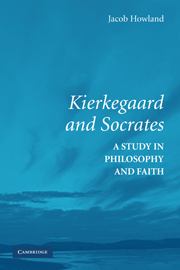Book contents
- Frontmatter
- Contents
- Note on Texts and Translations
- Acknowledgments
- Kierkegaard and Socrates
- Introduction
- 1 Johannes Climacus, Socratic Philosopher
- 2 Climacus's Thought-Project
- 3 Platonic Interlude: Eros and the God
- 4 Climacus's Poetical Venture
- 5 The Paradox and the Passion of Thought
- 6 Self-Love and Offense
- 7 Faith and the Contemporary Follower
- 8 Climacan Interlude: On Historical Necessity
- 9 The Follower at Second Hand and The Moral
- 10 Socrates in Postscript
- Epilogue: Kierkegaard on Christ and Socrates
- Works Cited
- Index
4 - Climacus's Poetical Venture
Published online by Cambridge University Press: 01 December 2009
- Frontmatter
- Contents
- Note on Texts and Translations
- Acknowledgments
- Kierkegaard and Socrates
- Introduction
- 1 Johannes Climacus, Socratic Philosopher
- 2 Climacus's Thought-Project
- 3 Platonic Interlude: Eros and the God
- 4 Climacus's Poetical Venture
- 5 The Paradox and the Passion of Thought
- 6 Self-Love and Offense
- 7 Faith and the Contemporary Follower
- 8 Climacan Interlude: On Historical Necessity
- 9 The Follower at Second Hand and The Moral
- 10 Socrates in Postscript
- Epilogue: Kierkegaard on Christ and Socrates
- Works Cited
- Index
Summary
In Chapter Two of Fragments, entitled “The God as Teacher and Savior (A Poetical Venture),” Climacus asks how and why the god of the religious hypothesis attempts to teach the truth. This poses a special challenge, because “no human situation can provide a valid analogy” to the god's love for the learner or the difficulties he confronts in attempting to reform him. Climacus nonetheless fashions a poem in order to “suggest” such an analogy (26). If this endeavor is even potentially worthwhile, it must be possible for the imagination, at least in some small measure, to bridge the gap that separates us from the god. This does not mean, however, that Climacus is the author of his “poetical venture” any more than he is the author of the religious hypothesis itself. On the contrary, he insists that no human being could have invented his poem. In that case, it must have originated with the god.
As in Chapter One, in which the philosophical hypothesis provides a backdrop for the development of the religious hypothesis, Climacus prepares us for his poem by examining Socrates' pedagogy. In doing so, he notes a major difference between Socrates and the god with respect to teaching and learning: whereas Socrates needs others in order to understand himself, the god is moved to seek out the learner not by need, but by love.
- Type
- Chapter
- Information
- Kierkegaard and SocratesA Study in Philosophy and Faith, pp. 79 - 101Publisher: Cambridge University PressPrint publication year: 2006

